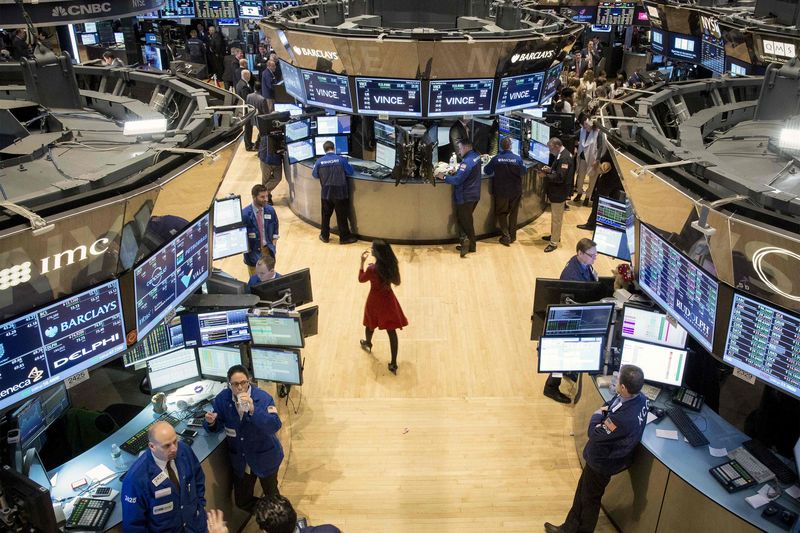* Dollar surges to highest in three years
* Wall Street falls at open
* ECB launches 750 billion-euro asset purchase program
* Euro STOXX 600 falls 0.4%, wipes out earlier gains
* Euro zone bond yields fall
* Asian stock markets : https://tmsnrt.rs/2zpUAr4
* Graphic: World FX rates in 2020 http://tmsnrt.rs/2egbfVh
(Updates prices throughout)
By Tom Wilson
LONDON, March 19 (Reuters) - The dollar surged on Thursday as extraordinary steps by central banks across the world to stem a coronavirus-induced financial rout saw mixed success, boosting bonds but failing to halt losses in stocks from Asia to Wall Street.
The dollar gained as investors rushed to secure liquidity, pushing the British pound GBP=D3 down 0.9% to its lowest since 1985 and rising 1% against major currencies =USD to its highest since March 2017.
The euro EUR=EBS fell 1.6% to $1.0726 per dollar, its lowest since April 2017, despite the European Central Bank pledging late on Wednesday to buy 750 billion euros ($820 billion) in sovereign debt through 2020.
That brought the ECB's planned purchases for this year to 1.1 trillion euro, with the new purchases alone worth 6% of the euro zone's GDP. L8N2BBACD
The emergency stimulus did stabilise bond markets somewhat, with government bond yields in Italy and across the euro zone dropping after the ECB move.
"The announcement (the ECB) has made has gone some way to comforting markets that borrowing costs in those economies won't be allowed to spiral higher," said Mike Bell, global market strategist at J.P. Morgan Asset Management.
Yet European stocks were unimpressed, falling back into negative territory after arresting their rout in early trading.
The broad Euro STOXX 600 .STOXX fell 0.4% after gaining more than 1% in early trading. Indexes in Frankfurt .GDAXI , Paris .FCHI and London's FTSE .FTSE all saw advances wiped out as the ECB move failed to staunch a month-long sell-off.
The mood spread to Wall Street, which fell in early trading. The Dow Jones .DJI sinking 2.8% after opening only just in the red. The S&P 500 .SPX fell 0.9%. MSCI's broadest index of Asia-Pacific shares outside Japan slumped by 4% .MIAPJ0000PUS . Korea and Taiwan led the losses as the index plunged to a four-year low, with circuit breakers triggered in Seoul, Jakarta and Manila. .SO
Expected price swings for some of the world's biggest currencies rocketed to multi-year highs as the demand for dollars forced traders to dump currencies across the board.
For the British pound versus the dollar, expected volatility gauges leapt to 24.4%, their highest level since before the 2016 Brexit vote. unresolved and really critical issue is what's going on in volatility," said Andrew Sheets, chief cross-asset strategist at Morgan Stanley (NYSE:MS). "I think that volatility needs to stabilise before the broader market can heal."
MSCI's world equity index .MIWD00000PUS , which tracks shares in 49 countries, fell around 0.8%.
ITALIAN YIELDS DOWN, GERMAN YIELDS UP
Italy, which has seen its borrowing costs jump in recent days, led the drop in yields after the ECB move.
Its two-year bond yields slumped by than 100 basis points to 0.41% IT2YT=RR , heading for their biggest one-day fall since 1996. Italy's 10-year bond yields slid as much as 90 bps to 1.40% IT10YT=RR .
The gap over the safer German Bund's yields tightened almost 100 bps from Wednesday's closing levels and were set for the biggest daily drop since the 2011 euro one crisis.
Germany's 10-year bond yield DE10YT=RR rose to a two-month high, reversing earlier falls following a report that the country will soon declare an exception to its debt brake. That would see Berlin issue new debt for the first time since 2013. the ECB move, the U.S. Federal Reserve promised a liquidity facility for money market mutual funds and the Bank of Japan made two unscheduled bond purchases totalling 1.3 trillion yen ($12 billion). Australian central bank slashed interest rates to a record low of 0.25%. reported huge strains in bond markets, however, as distressed funds sold any liquid asset to cover losses in stocks and redemptions from investors. only central banks but governments are throwing everything at the economy right now, but markets aren't responding," said Luca Paolini, chief strategist at Pictet Asset Management.
Commodities also fell as the virus outbreak worsened.
Gold XAU= fell 0.7%, buffeted like other assets by high volatility. Oil rose after plunging overnight to an 18-year low, though Brent LCOc1 gave up most of its gains. It was last up half a cent at $25.39. O/R
Underlining expectations of severe economic damage from the pandemic, J.P. Morgan economists forecast the U.S. economy will shrink 14% in the next quarter and the Chinese economy will lose more than 40% on an annualised basis in the current one. is no longer doubt that the longest global expansion on record will end this quarter," they said in a note. "The key outlook issue now is gauging the depth and the duration of the 2020 recession."
For Reuters Live Markets blog on European and UK stock markets, please click on: LIVE/
<^^^^^^^^^^^^^^^^^^^^^^^^^^^^^^^^^^^^^^^^^^^^^^^^^^^^^^^^^^^ Equities and bonds total return
https://tmsnrt.rs/3deypWu Emerging market currencies sink
https://tmsnrt.rs/39YjsWG
^^^^^^^^^^^^^^^^^^^^^^^^^^^^^^^^^^^^^^^^^^^^^^^^^^^^^^^^^^^>
